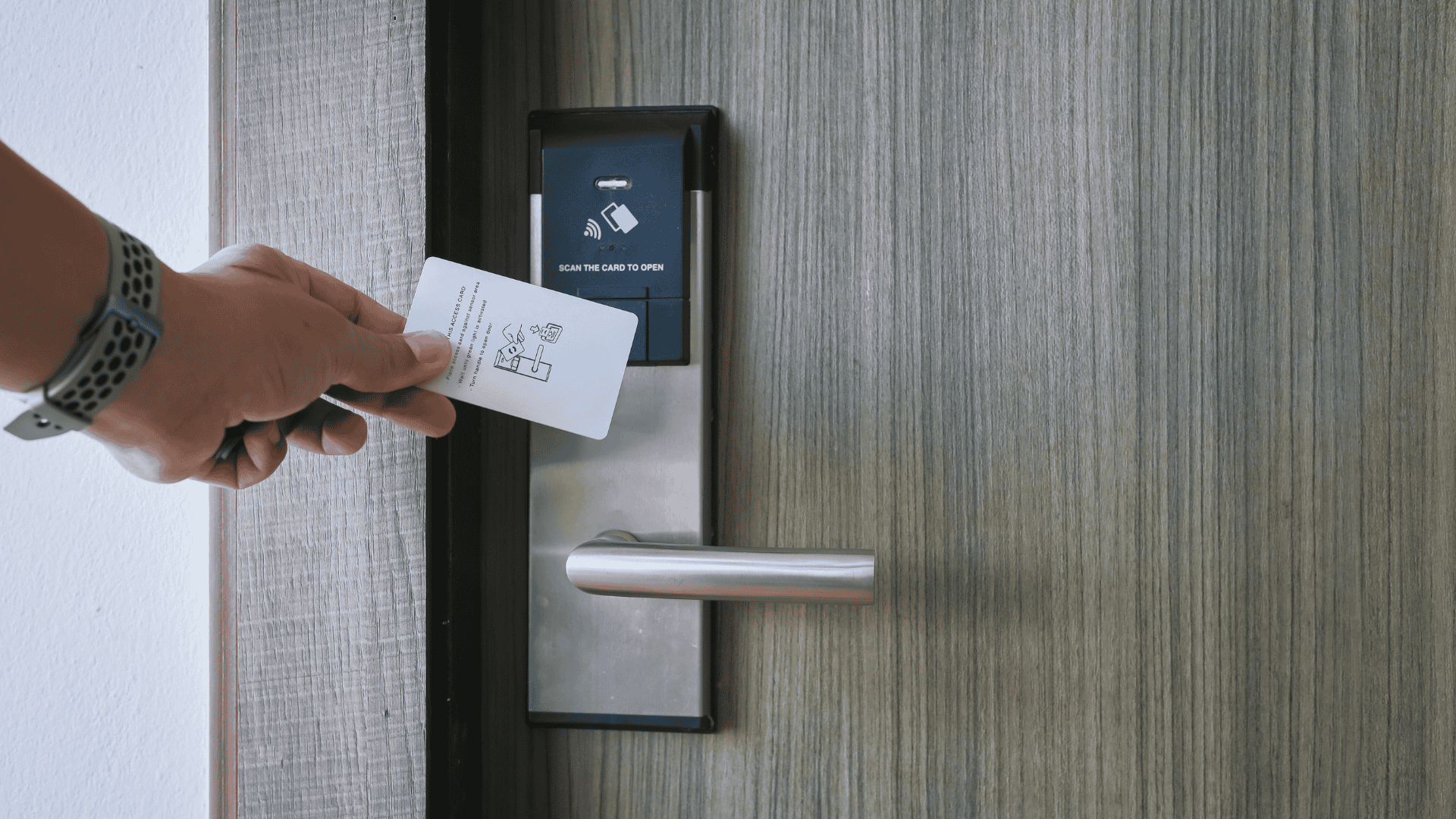In the era of digital transformation, the hospitality industry is not left behind.
The rise of hotel room technology is a testament to the industry’s commitment to innovation and the pursuit of superior guest experiences.
Today, the concept of a ‘smart room’ in a hotel is becoming more of a standard than a luxury, driven by the increasing demand for personalized, seamless, and high-tech experiences from today’s tech-savvy travelers.
The integration of smart technologies into hotel rooms is not just about modernizing the space or adding a touch of luxury.
It’s about redefining the guest experience, making it more convenient, personalized, and engaging.
From smart thermostats that allow guests to control room temperature to smart TVs that offer personalized content, these technologies are transforming the way guests interact with their environment and how hotels deliver their services.
This blog post will delve into the world of hotel room technology, exploring 12 innovative technologies that are making their way into hotel rooms, enhancing guest experiences, and streamlining hotel operations.

#1 Smart Thermostats
Smart thermostats are revolutionizing the way guests interact with their hotel rooms.
These devices allow guests to control the room’s temperature using their smartphones or voice commands, ensuring a comfortable stay tailored to their preferences.
But the benefits extend beyond guest comfort. For hoteliers, smart thermostats offer significant energy savings.
They can automatically adjust the temperature based on room occupancy, reducing energy consumption when rooms are unoccupied.
This not only leads to cost savings but also contributes to the hotel’s sustainability efforts.
In an era where eco-friendliness is increasingly important to consumers, the integration of smart thermostats can enhance a hotel’s reputation as an environmentally conscious establishment.
#2 Voice Assistants
Voice assistants like Amazon’s Alexa or Google Home are becoming increasingly popular in hotel rooms.
These devices can be used to control various room features such as lighting, temperature, and television, enhancing the guest experience with hands-free convenience.
Additionally, they can answer queries, provide local recommendations, and even make reservations at the hotel restaurant, acting as a personal concierge for each guest.

#3 Smart Lighting
Smart lighting systems are another key component of the modern hotel room technology suite.
These systems offer guests the ability to personalize their room’s ambiance at the touch of a button or through voice commands.
From adjusting the brightness to changing the color, guests can create an environment that suits their mood or activities, whether they’re working, relaxing, or getting ready for a night out.
For hotels, smart lighting systems not only enhance the guest experience but also contribute to energy efficiency.
Many smart lighting systems can automatically adjust based on natural light levels or turn off when the room is unoccupied, helping to reduce energy usage and contribute to a hotel’s sustainability goals.
#4 Smart Televisions
Smart TVs have become a standard feature in hotel rooms, significantly enhancing the in-room entertainment experience.
These devices offer more than just cable television.
They provide access to streaming services, social media, games, and other apps, allowing guests to enjoy their favorite content just as they would at home.
Some smart TVs even offer personalized content recommendations based on the guest’s viewing habits.
Additionally, smart TVs can be integrated with other hotel room technologies. For instance, guests can use their TV to control room lighting, temperature, or even order room service.
By offering a multifunctional platform that caters to various guest needs, smart TVs are playing a crucial role in creating a comfortable and engaging hotel stay.

#5 Keyless entry
Smart locks are transforming hotel security and guest convenience.
These advanced locking systems provide keyless entry to rooms, eliminating the need for traditional keys or cards that can be easily lost or demagnetized.
Guests can unlock their rooms using a secure app on their smartphones or, in some cases, through biometric features like fingerprint recognition.
This not only enhances guest convenience but also improves security by reducing the risk of unauthorized access.
For hoteliers, smart locks offer additional benefits. They can monitor room access in real-time, instantly deactivate lost or stolen ‘keys,’ and even allow for remote check-in and check-out processes.
By combining security, convenience, and operational efficiency, smart locks are a valuable addition to the hotel room technology mix.
#6 Smart Mirrors
Smart mirrors add a touch of luxury to the hotel bathroom experience.
These interactive mirrors can display news, weather, and even support internet browsing.
Some models also offer features like touch control, anti-fog, and integrated lighting.
By combining functionality with elegance, smart mirrors enhance the guest experience.
#7 Smart Curtains
Smart curtains or blinds offer guests the convenience of controlling window coverings via a smartphone app or voice command.
This allows guests to easily adjust natural light levels in their room, enhancing comfort and privacy.
Some smart curtain systems can also be programmed to open or close at specific times or in response to light levels, contributing to energy efficiency.
#8 Smart Mini-bars
Smart mini-bars equipped with sensors can automatically charge guests for consumed items and notify staff when they need to be restocked.
This not only enhances guest convenience by eliminating manual check-out processes but also improves operational efficiency and accuracy for the hotel.
#9 Smart Showers
Smart showers offer a personalized bathing experience for guests.
They allow guests to pre-set their preferred water temperature, pressure, and even shower duration.
Some models also offer features like steam control and integrated sound systems.
By offering a spa-like experience, smart showers add a touch of luxury to the guest’s stay.
#10 Wireless Charging
With the proliferation of smartphones and other wireless devices, wireless charging is a much-appreciated feature in hotel rooms.
It allows guests to conveniently charge their devices anywhere in the room without the need for cables or outlets.
Some hotels are even integrating wireless charging into furniture like bedside tables and desks, further enhancing guest convenience.

#11 Smart Room Service
Smart room service is revolutionizing the way guests order food and services in hotels.
By using a smartphone app or in-room tablet, guests can browse menus, place orders, and even track their order’s progress in real time.
Some systems also allow guests to schedule wake-up calls, request housekeeping, or book spa appointments.
This digital approach not only enhances guest convenience but also improves operational efficiency by reducing the potential for miscommunication or errors.
#12 Smart Energy Management
Smart energy management systems are becoming increasingly important in the hospitality industry.
These systems monitor and control energy usage in hotel rooms, adjusting lighting, temperature, and other energy-consuming features based on room occupancy or pre-set schedules.
This not only reduces energy costs for the hotel but also contributes to sustainability efforts.
For guests, it ensures a comfortable environment without any manual adjustments.
In an era where environmental consciousness is a significant factor for many travelers, smart energy management can also enhance a hotel’s reputation as a green establishment.
Conclusion
The rise of hotel room technology is a testament to the hospitality industry’s commitment to innovation and the relentless pursuit of superior guest experiences.
As we’ve explored, the integration of smart technologies into hotel rooms is transforming the way guests interact with their environment and how hotels deliver their services.
From smart thermostats that ensure optimal comfort to smart locks that enhance security, these technologies are redefining the hotel stay.
But beyond enhancing the guest experience, these technologies also offer significant benefits for hoteliers.
They improve operational efficiency, reduce energy consumption, and provide valuable data that can be used to further personalize and improve guest services.
As we look to the future, it’s clear that the smart room is not just a trend; it’s the new standard for hospitality.
Hotels that embrace these technologies will not only meet the evolving expectations of today’s tech-savvy travelers but also gain a competitive edge in an increasingly digital world.
The journey towards fully integrated smart hotel rooms is just beginning, and we can expect to see even more exciting developments in this space.
From AI-powered personal assistants to IoT-connected devices, the possibilities are endless.
As we continue to explore and adopt these technologies, one thing is certain: the future of the hospitality industry is smart, connected, and incredibly exciting.



